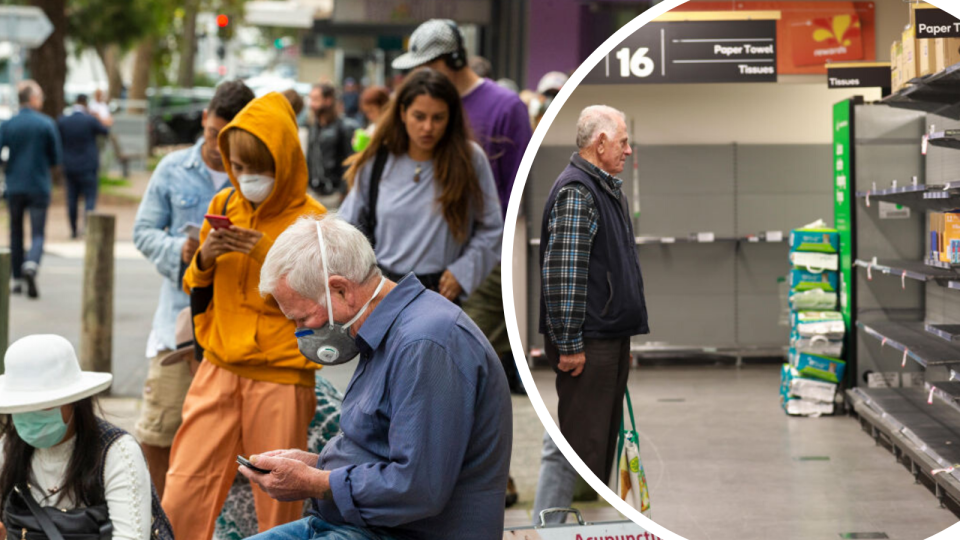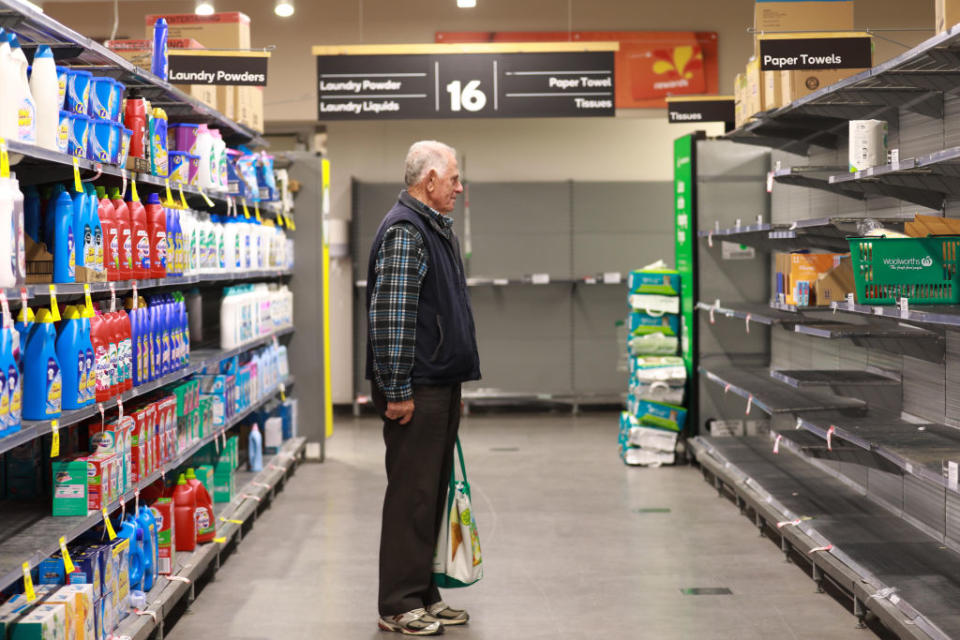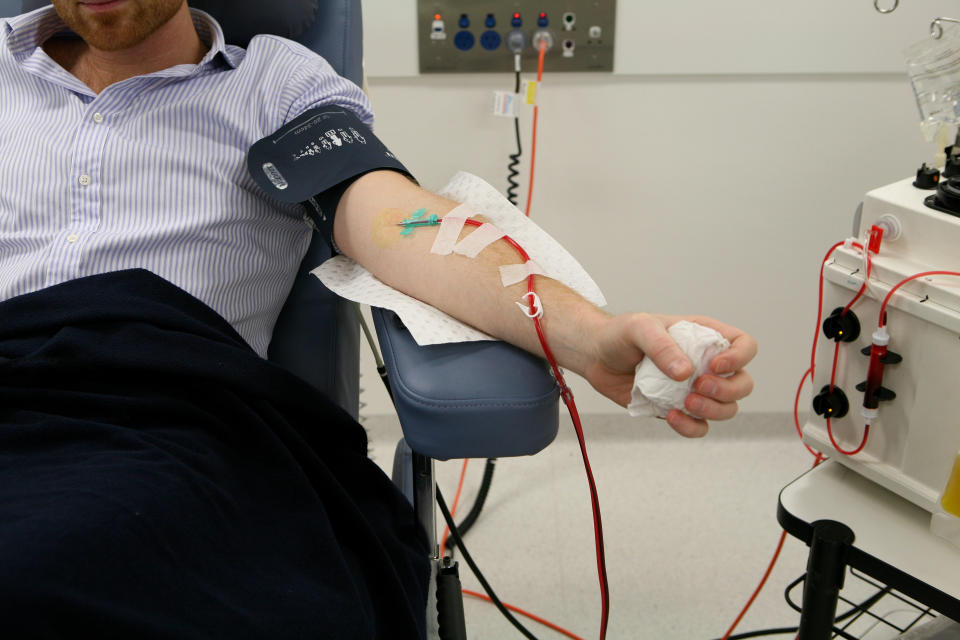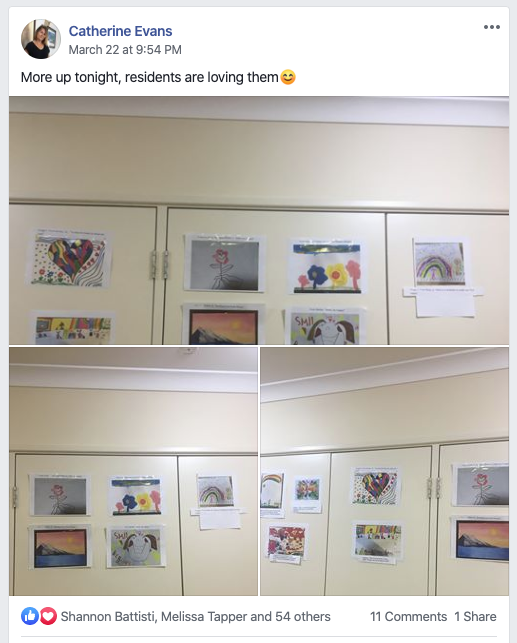Donate, volunteer, check in: How to help during the coronavirus crisis

During the Australian bushfire crisis, Aussies dug deep to help out neighbours affected by the fires.
People not only donated more than half a billion dollars to assist with recovery, they shopped with impacted businesses and helped boost local tourism in affected areas.
But the bushfire crisis was barely over, when another reared its ugly head.
The Covid-19 pandemic puts some of Australia’s most vulnerable people in great danger, with the mortality rate among older people significantly higher than the rest of the population.
At time of writing, 2,136 Australians have contracted the disease, and 8 people have died. Globally, more than 382,000 people have been diagnosed with Covid-19 more than 16,500 people have died.
Not only that, but the outbreak has caused panic-buying which has stripped supermarket aisles bare, forcing Coles and Woolies to launch a special shopping hour exclusively for elderly and disabled shoppers to buy their essential items.
Restaurants and retailers are also slashing delivery fees to help those in self-isolation, and banks threw a $100 billion lifeline at small business owners.
Amongst the chaos, many Aussies are asking: how can I help out, especially for the most vulnerable members of our community?
The answers are surprisingly simple: it just takes a little time, effort, and a little extra sensitivity.
1. Start with empathy and understanding
To those who have been quarantined due to contracting Covid-19, just some empathy is needed, said Red Cross Emergency Services resilience adviser John Richardson.
There have been reports of supermarket staff and healthcare workers copping abuse from members of the public as tensions run high, while people of Asian ancestry have experienced racial abuse.
“This is a stressful situation for them and stigma will make things worse,” he told Yahoo Finance.
“COVID-19 is not the fault of any individual or community. It is not an excuse for racism and intolerance. Sharing the facts and being respectful and supportive towards each other are the best ways to fight it.”
You can start by simply checking in on friends and community members, Richardson said.
2. Stay in touch; help out a neighbour or a healthcare worker
“Look after those most at risk – your neighbour living alone, elderly friends, people with a disability and people with existing medical conditions,” he added.
Echoing Richardson’s sentiments, Bupa aged care managing director Suzanne Dvorak said Australia’s vulnerable just need to feel a strong network around them, even if they can’t be physically together.
“As the current situation evolves, we encourage family and friends of residents who are unable to visit to maintain regular contact with their loved ones via telephone, video calls, letters, or cards,” she said.
“Please check on elderly neighbours and offer assistance with shopping or other tasks while they may be isolated.”

Red Cross runs a social support and companionship volunteer program, but Yahoo Finance understands volunteers have been asked to arrange video calls where possible instead of in-person visits to minimise the risk of elderly people contracting the virus.
But it’s not just the elderly who need help. During this crisis, it’s healthcare workers who are on the frontlines of the pandemic – yet they’re often the ones missing out on sorely needed essentials as they pull 12-hour and night shifts.
Facebook group Adopt A Healthcare Worker was set up in mid-March by Perth resident Chris Nicolas after a nurse friend was unable to find toilet paper at the shops.
The page now has more than 45,000 members that include both healthcare workers in need of assistance – such as picking up groceries or babysitting – to be able to ask for help from locals, and members of the public who respond to the requests.
To provide social support and companionship with an elderly person, you can still volunteer with Red Cross which will link you up with older people who live alone or at aged care homes, who have few social connections, people with disability and people recovering from mental illness.
3. Donate your blood
The coronavirus has placed significant pressure on Australia’s health system. On Tuesday Red Cross’ blood donation arm Lifeblood CEO Shelly Park put out a call for 14,000 more blood donors, warning that the nation’s blood supply could quickly dry up otherwise.
“There are now fewer people able to donate over the coming weeks. Last minute cancellations are also putting a dent in blood stocks at a time when donors are in urgent need,” she said.

“As we all know, there is no substitute for blood. It is a critical resource, and right now, we need more people booking appointments to donate.”
Park said that there has been no evidence that coronavirus can be transmitted through blood, and that the organisation’s robust processes prevents sick people from donating.
“To ensure there is a sufficient blood supply, we are appealing to donors to keep their appointments if well and healthy and are inviting new donors or those who haven’t donated for a while to come forward to help us.”
4. Support a GoFundMe – or set up your own
GoFundMe regional manager Nicola Britton said that the number of Covid-19-related pages had spiked by 82 per cent in the last 24 hours alone.
“These funds have been launched to help those at the heart of the crisis and to fund needs big and small,” she said.
“From coffees to fuel night shift health care workers, relieving small business owners from financial pressures, or backing businesses impacted by event cancellations – generous Australians are helping to send money to the heart of the issue.”
Some Australian coronavirus-related GoFundMe campaigns include a relief fund for struggling independent artists and a fund to pay the wages of staff from Melbourne’s The Old Bar, The Carringbush Hotel and Collingwood Station Coffee.
“We’re hoping to raise $16,000 / week for 4 weeks (total amount: $64,000), which will cover just some of these wage costs. None of this money will go to the owners, to utilities or rent; 100% of donated funds will be paid to staff to help them get through this period,” fund organiser Liam Matthews wrote. Check out Australian GoFundMe pages here.
Alternatively, buy a healthcare worker a coffee. The Short Black Night Shift coffee cart visits hospitals in Sydney that delivers late-night hits of caffeine for frontline workers. All the funds of the Buy Them A Coffee page – which has raised more than $23,206 – go to the coffee cart. There is also a Melbourne, Wollongong, Hobart/Southern Tasmania and Queensland version.
If there is an individual, cause, small business or organisation you’d like to corral some support for, Britton said “anyone can start a GoFundMe page”.
The platform has teams working to vet pages and check that donations get to where they’re meant to, and Covid-19 related pages are being checked to ensure they’re legitimate.
5. Donate food
With Covid-19 keeping people at home, volunteer numbers dropping and supermarkets stripped bare, Foodbank Australia is in need of donations, whether it’s financial or your pantry items. While they welcome non-perishable household items that are in date, they’ve flagged the following as key staples:
Deodorant, soap and body wash
Shampoo, conditioner and sanitary items
Baby wipes and nappies
Dish washing liquid and detergent
Canned fruit, vegetable, soup and fish
Noodles, pasta, and rice
Baked beans and spaghetti
Baby food and formula
If it’s time that you’d like to give instead, you can volunteer with Foodbank Australia, where volunteers help sort and label items, stock shelves and pack food orders.
You can also donate your food to OzHarvest, which can even pick up your food within 2-3 hours from where you are.
6. Donate to charities
Australians may be feeling donation-fatigued from the bushfire crisis and also feeling the pinch from the stalling economy – but a spokesperson for the Australian Charities and Not-for-profits Commission (ACNC) said this was a difficult time for many, and encouraged Aussies to empty their pockets if they could.
“We encourage people to look out for their neighbours; providing essential supplies may be one way to help people, and donating to, or volunteering for, registered charities who provide assistance to vulnerable communities may be another.”
You can find registered charities in your state or find out whether a charity is officially registered on the ACNC website.
CARE Australia CEO Peter Walton urged Aussies to think about those in poorer countries.
“Countries with under-resourced health systems – such as those in sub-Saharan Africa, or our neighbours in Asia and the Pacific – are least prepared to cope with coronavirus,” he told Yahoo Finance.
“As Australians, our dollars can go a really long way in these countries.”
7. Volunteer your time
If you’re fit, healthy and haven’t been required to self-isolate, you could volunteer with an organisation that needs an extra pair of hands.
Seek has its own volunteering platform at volunteer.com.au, and you can also sign up to be a volunteer at Volunteering Australia as well as Bupa Aged Care. You can also volunteer with the Red Cross and St Vincent de Paul.
You can also sign up to be a volunteer with aged care provider Arcare Australia, which operates in NSW, Queensland and Victoria.
However, since the coronavirus affects the elderly more severely, many aged care homes have taken proactive steps to protect their residents, meaning that visiting hours are very restricted.
For instance, Bupa visiting hours are now limited to one visit per resident per day for 30 minutes between 2-5pm every day and must be pre-booked. Volunteers will also have to abide by these rules.
“We understand these restrictions will be difficult for some, and we will help to arrange phone or video calls for residents to keep in touch with their loved ones,” according to a statement by Bupa.
Arcare is currently not allowing visits to clients, meaning you will need to get in touch with residents in other ways, such as arrange phone calls, emails or video calls.
Don’t forget about small, local charity organisations which often deliver targeted relief. For example, Orana NSW in Sydney’s south has low-cost social inclusion groups, free counselling services, tax help, emergency relief, and assistance for domestic violence survivors and families with very young children who have no social support, so find out about local organisations near you.
8. Get your little one to pitch in
With social distancing measures ramping up, visits to the grandparents’ house may need to be postponed. But a Facebook group called ‘Drawings for Oldies’ has one aim: to brighten the day of aged care home residents with a drawing from a ‘little person’.


"In these times of social isolation and aged care home lockdowns, I think it’s a great way to make older people feel as though they’ve not been forgotten about, and that they are still loved - albeit from afar,” page owner Clare Rigden told Yahoo Lifestyle.
While the owner of the page was emailing the physical drawings to homes, you can simply print them out and deliver it to your closest aged care home.
They weren’t the only ones to have this idea.
Yesterday Senior Art Club thought about some of the more vulnerable in our society at this time so made and wrote postcards to some of the residents of a nursing home. #CoronavirusKindness pic.twitter.com/xGzFUjJYEf
— Art at Beaudesert (@BeaudesertArt) March 18, 2020
Do you know of any other ways Australians can help during the coronavirus crisis? Let us know at jessica.yun@yahoofinance.com.
Make your money work with Yahoo Finance’s daily newsletter. Sign up here and stay on top of the latest money, news and tech news.
Follow Yahoo Finance Australia on Facebook, Twitter, Instagram and LinkedIn.

 Yahoo Finance
Yahoo Finance 
